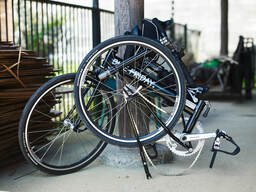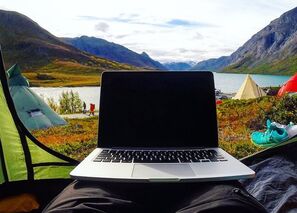And so it was that I signed up for the SENSE 2020 Conference. SENSE is the Society of English-language professionals in the Netherlands, and this year’s event marks the organisation’s 30th anniversary. The plan had been to hold the conference in Maastricht. If that had gone ahead, it’s unlikely that I’d have been able to attend in person. However, when it moved online, taking place over three afternoons in June, I decided to book a place.
As it happened, the conference coincided with a confluence of deadlines in my work, something I’d have taken steps to avoid if I had been travelling to Maastricht for a few days away from my desk. As a consequence, I decided to concentrate on those sessions that seemed most relevant to my work as an editor. In this article I describe just six of those sessions, in an attempt to give a flavour of the conference and to illustrate its relevance to all language professionals.
There are full details of the programme on the SENSE website. I’ve chosen to write up a summary and my impressions of the following sessions:
- Be(a)ware of (round) brackets (especially ‘Dutch’ ones)! Joy Burrough-Boenisch
- ‘I just moved on’ – Museum translations Tony Parr
- How much time does quality require? Brian Mossop
- Using your network to branch out into new areas Sally Hill
- From whining to shining Tiina Kinnunen
- Editing in the era of digital nomadism: How I look after my mental and physical health Marieke Krijnen
And at the end of this article I summarise some of the main points I took away from the conference.
Be(a)ware of (round) brackets (especially ‘Dutch’ ones)!
Joy Burrough-Boenisch
Joy showed many more examples from both Dutch and English, including ones that demonstrate the creative use of brackets to make a point such as ‘Plan(et) B’ and ‘un(der)paid workers’.
Clearly, if you’re translating from Dutch, or editing English written by a Dutch native speaker, you need to carefully consider what the author intended, rather than simply imposing the English rules on bracket use and potentially changing the meaning.
‘I just moved on’ – Museum translations
Tony Parr
How a translation is presented can also interfere with its usefulness for the visitor. Tony showed examples of English text in minuscule type, or so low down on a panel that it was almost impossible to read from a standing position.
One fascinating aspect of this presentation was Tony’s own observations of how visitors reacted to English translations at different museums. His findings weren’t encouraging: at one museum he noted that of 50 non-Dutch-speaking visitors, only one had read the English translation provided – and even then, only some of it.
The key point that made this session so relevant – even for a non-translator like me – is that the reader (or visitor, in this case) needs to be at the centre of the experience. This sounds obvious, but Tony felt that some museum professionals hadn’t really taken this on board. For example, one museum had three ‘visitor profiles’ that were intended to guide its public-facing communications. All these profiles were Dutch speakers – yet the staff told Tony that 50% of the museum’s visitors do not speak Dutch.
Plain English, non-technical language and an appropriate amount (and visibility) of text should be at the heart of all written material – not just text in a museum!
How much time does quality require?
Brian Mossop
Brian’s key piece of advice was to focus on which level of quality you are being asked to produce (for the corresponding price). The four levels Brian defined were intelligible, informative, publishable and polished. If a client is paying (and allowing enough time) only to make a text intelligible, an editor or translator needs to avoid devoting too much time and effort to trying to produce a polished end-product. That’s easier said than done, of course.
Keeping this in mind can help to make sure that quality, price and time are better aligned.
Using your network to branch out into new areas
Sally Hill
Sally looked at the different ways you can ‘find your tribe’ as a freelancer. Joining professional networks is one option – or why not start your own?
Volunteering can be another way to build relationships with colleagues and to develop new skills. I’ve had past experience of this as a director of the Society for Editors and Proofreaders (now the Chartered Institute of Editing and Proofreading) and as the founder of an SfEP/CIEP local group.
Underlying all such activities is the idea of ‘trust transfer’. If you get to know others within your network, it’s more likely that they’ll come to trust your skills and expertise. This can lead to work opportunities, whether through direct referrals or word of mouth, and even to joint projects in which freelancers with complementary skills can provide a complete service. You can also pass on work to trusted colleagues if you aren’t able to take it on yourself.
From whining to shining
Tiina Kinnunen
There were two main strands to Tiina’s advice: productivity and brand image. On productivity, Tiina advised freelancers to take a long hard look at the work (and specifically the rates) they are taking on and to make informed decisions about future jobs. Many translators work on per-word rates, but a high per-word rate doesn’t always result in an attractive hourly rate. And remember – you don’t have to accept every job.
Productivity also encompasses the services you provide. You need to be clear with clients about the level of work you are offering on a particular job – beware of offering perfection if the client can only pay for (and may only be expecting) text that is fit for purpose. Different types of clients can also have an impact on productivity: ‘difficult’ clients can be very time-consuming!
In terms of your image, it can often help to find a niche or specialism so that you can become (and be seen as) an expert in that particular field. When it comes to providing services for your clients, you need to present yourself as part of the solution for their issue, not part of the problem. Becoming the ‘go to’ expert for your clients is the ultimate goal.
Tiina also stressed the importance of finding trusted colleagues with whom you can share best practice and collaborate on projects, something that can ultimately lead to new clients and more business.
Editing in the era of digital nomadism: How I look after my mental and physical health
Marieke Krijnen
For example, when it comes to exercise, digital nomads don’t usually have the option of joining a gym or a regular class, or of participating in a team sport, and these are all things we haven’t been able to do during the coronavirus crisis. Going for a walk or a run is an ideal way of exercising individually. Using hashtags such as #stetwalk and #stetrun can add an element of fun, and there are even virtual groups (e.g. the CIEP Run On Group on Facebook) to provide motivation. Office equipment such as a treadmill desk might be another solution.
The office set-up is also important from an ergonomics point of view. Good posture is key: adjusting screen height and having the appropriate chair and other accessories can make a big difference. Marieke has found that varying her sitting position and location can help. Working in a café or co-working space hasn’t been possible recently, but she suggests spending some time at a desk, some in an armchair and some in a park or garden.
Good work–life balance is essential. Marieke’s tips included blocking emails outside working hours, using apps to restrict access to social media, taking weekends off, finding different places to work, and pursuing a hobby that gets you out of the house.
Marieke is a great believer in making connections, and these can be vital in maintaining good mental health. At the moment such connections are likely to be virtual ones. Marieke mentioned digital support communities such as Twitter and the Editors’ Association of Earth Facebook group, as well as professional associations (which often provide forums and opportunities to ‘meet’ digitally). Conferences (like the SENSE one) can also be a chance to build a network, as can co-working spaces and face-to-face meet-ups – when these become available once again.
What I particularly admired about Marieke’s session was her honesty. Although she offered lots of excellent advice, she admitted that she herself didn’t always get it right and had sometimes felt overwhelmed and stressed. Simple things like taking a shower or going outside can really help. It’s vital to give yourself a break!
- Put the reader at the centre of the text.
- Keep in mind the time/price/quality triangle when approaching your work and thinking about your productivity.
- Position yourself as a ‘go to’ person, both within and outside your profession.
- Network, network, network! Forging connections with your colleagues has both professional and personal benefits.
I certainly hope to be able to attend the SENSE conference again in future, be it virtually or physically.




